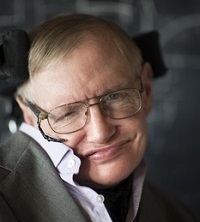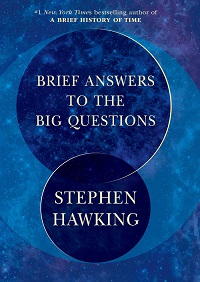|
TRANSLATE THIS ARTICLE
Integral World: Exploring Theories of Everything
An independent forum for a critical discussion of the integral philosophy of Ken Wilber
 Since 1990 Gary Stogsdill has been a faculty member at Prescott College where he currently teaches courses in humanistic mathematics, science appreciation, and wisdom studies. He has a blog called "Pursuing Wisdom Now", which features articles on contemporary spirituality. Since 1990 Gary Stogsdill has been a faculty member at Prescott College where he currently teaches courses in humanistic mathematics, science appreciation, and wisdom studies. He has a blog called "Pursuing Wisdom Now", which features articles on contemporary spirituality.
SEE MORE ESSAYS WRITTEN BY GARY STOGSDILL Hawking's Approach to a Theory of EverythingAnd the Folly of ScientismGary StogsdillWe will know the mind of God by the end of this century. (Stephen Hawking, 2018)
Being brilliant in one way of knowing does not give us authority over other ways of knowing.
Stephen Hawking was nothing if not inspiring. Diagnosed with motor neuron disease at the age of 21, he somehow managed to live 55 more years as one of the most insightful cosmologists throughout this entire time period. His iconic image—immobile in a wheelchair with a big boyish grin—and his ability to explain complex scientific ideas in down-to-earth language spiced with good-natured humor, endeared him to many millions. Born on the 300th anniversary of Galileo's death and deceased on the 139th anniversary of Einstein's birth, his life approached the greatness of those two luminaries of science through his pioneering work on black holes, his proof that our universe had a beginning, and his contributions toward a theory of everything. Hawking's approach to a theory of everything, as with all physicists and cosmologists, consisted of searching for the mathematical equations that allow our current understanding of gravity and quantum mechanics to mesh together. In terms of Ken Wilber's integral theory, Hawking believed that having coherent equations for one discipline within one of the four quadrants of human inquiry will allow us to understand everything. As he makes clear in the closing of his 2002 book The Theory of Everything, Hawking thought that these equations would not only contribute toward knowing how the universe exists, but also why: If we do discover a complete theory…then we shall all be able to take part in the discussion of why the universe exists. If we find the answer to that, it would be the ultimate triumph of human reason. For then we would know the mind of God. (p. 166-7)  Stephen Hawking When Hawking, an atheist, says “we would know the mind of God,” he's using a figure of speech to mean that we will find the answers to all our questions…we will literally know everything. This obvious overreach illustrates how scientists can easily overstep the boundaries of their discipline and trespass on the rightful domain of philosophy and spirituality. As stated in my previous essay for Integral World titled Science and Spirituality as Soulmates, I view science as the systematic exploration of physical reality through a process of inquiry known as the scientific method, and I view spirituality as how we explore deeper meaning, purpose, and values in life in order to 1) nourish our own need for these, 2) live in right interaction with others, and 3) enter into relationship with a greater whole. When scientists become devotees of their own materialistic way of knowing, believing they have the only path to what is real and can therefore cast judgment on all other ways of knowing, they devolve into scientism, “an exaggerated trust in the efficacy of the methods of natural science applied to all areas of investigation (as in philosophy, the social sciences, and the humanities)”. In this essay, I will use the writings of the eminently inspiring Stephen Hawking to show examples of how scientism behaves less like science and more like the thing they often think they're fighting against: a fundamentalist belief system or the realm of superstition. First, though, in fairness to Hawking his understanding of spirituality seems to be exceptionally limited to a traditional interpretation of Christian religion. If he and other devotees of scientism had a more nuanced approach to spirituality—for example, if they were to apply their considerable intellect to Ken Wilber's integral theory—they might not be so quick to dismiss all aspects of spirituality. But this trait actually illustrates the first problem with scientism: Being brilliant in one way of knowing does not give us authority over other ways of knowing. In fact, with few exceptions it probably indicates that we will know pathetically little about other ways of knowing because our very brilliance suggests a life confined to that one way of knowing and often to just one discipline therein. A second problem with scientism is not respecting that humans live in various realities (four quadrants) instead of just the physical reality of atoms, molecules, and energy interactions that can be depicted by mathematical equations. Expressed in more integral terms, scientism is guilty of thinking that one discipline within one of the four quadrants of human knowing is the one road to reality. When Hawking, an atheist, boldly states, “For me asking if God exists is a valid question for science” (Brief Answers to the Big Questions, 2018, p. 29), he really means that he believes science can disprove the existence of spiritual realities and that spiritual inquiry itself is invalid. Such misguided arrogance is comparable to devotees of a fundamentalist religion believing that they can dismiss established science because of their religious beliefs. 
In his final book, Brief Answers to the Big Questions, Hawking believes he has disproven his concept of God by declaring: “It is possible that nothing caused the Big Bang” (p. 35). Here's his argument: Since the Big Bang was not only the beginning of all the space, matter, and energy of our universe but also of time itself, “there is no possibility of a creator, because there is no time for a creator to have existed in” (p. 38). Hawking is claiming that whatever brought the universe into existence must necessarily be constrained by the properties of the universe itself. If A creates B, then A has to have the same limitations as B. There's no logical basis for this assertion. It's as absurd as saying that if a human creates a painting, then that human has to be confined to the two-dimensional canvas of the painting. To the contrary, by definition spiritual realities would transcend the properties of the universe. Hawking goes on to declare that the above breakthrough in his understanding (“there is no possibility of a creator”) leads him to “a profound realization: there is probably no heaven and afterlife either” because “there is no reliable evidence for it, and it flies in the face of everything we know in science” (p. 38). This illustrates a third problem with scientism (really a subset of the second problem above): If science can't prove something, it's not real. Or put another way, If my belief system and its accompanying method of inquiry can't show something to be real, then it doesn't exist. This seems to go beyond even fundamentalist religion and into the realm of superstition. I suggested above that Hawking, one of the most brilliant minds of the last half-century, has allowed scientism to get the better of him and produce illogical reasoning. Who am I to offer such an impertinent critique? Well, I'm not alone. Here's the most compelling essay I've read on scientism[1]. Early in this essay, Carolina Distinguished Professor of Biological Sciences at the University of South Carolina, Austin L. Hughes, observes that “scientists can be prone to errors of elementary logic,” and then near the end of the essay he concludes that “scientism appears to have as much in common with superstition as it does with properly conducted scientific research.” Because scientists are brilliant within their specific discipline of science doesn't mean they always reason well, especially so when they overstep the boundaries of scientific inquiry. This leads to a final problem with scientism: Because we live in a culture that largely assumes science to be the final word on the validity of anything, many members of society are predisposed to accept as gospel whatever a famous scientist like Stephen Hawking says. That kind of deference is fine as long as the scientist is communicating about research in his or her field. But when a scientist has the agenda of scientism and utters a personal bias like “there is no possibility of a creator,” we need to bring this scientist down from his or her privileged tower and into the realm of ordinary mortals who may be—and in this case definitely is—guilty of “errors of elementary logic.” Without question, one of the great success stories of the last few hundred years is the unparalleled power of science to uncover the secrets of our natural world. Like the human rational mind that gave it birth, science is a force to be reckoned with. I suspect that eventually science will be able to create the mathematical equations that unify the fundamental theories of physics, but this achievement may do little to contribute toward our understanding of the big questions of life that comprise philosophical and spiritual inquiry. And the hyperbole that by unifying the equations of physics we will then “know the mind of God” is scientism in full regalia. NotesAustin L. Hughes, "The Folly of Scientism", thenewatlantis.com. Number 37, Fall 2012, pp. 32-50.
|